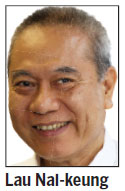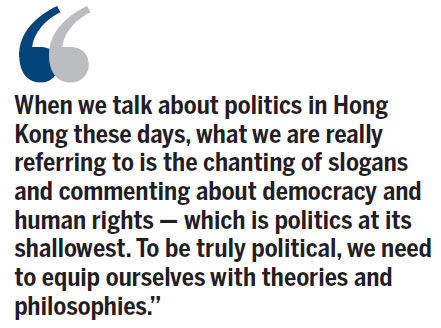Hong Kong needs to be more political
Updated: 2014-06-10 07:18
By Lau Nai-keung(HK Edition)
|
|||||||||
Some people say Hong Kong is too political. But I don't think it is political enough. When we talk about politics in Hong Kong these days, what we are really referring to is the chanting of slogans and commenting about democracy and human rights - which is politics at its shallowest. To be truly political, we need to equip ourselves with theories and philosophies.
Mainlanders were taught a certain version of dialectical materialism at school. Most did not take this philosophy seriously. Many even found it ridiculous. But later in life some found this training to be a valuable anchor when facing the complex realities of life. They could re-affirm, revise or reject the philosophy. But dialectical materialism will always be there, in their minds, as a reference point.
Ideas are powerful. Former Federal Reserve Board chairman Alan Greenspan - along with many other Americans - was influenced by the writer and philosopher Ayn Rand. A friend's daughter told me that while in her sophomore year, reading "general studies" at Cornell University, she was given a reading list that included, among other writings, the French

structural Marxist philosopher Louis Althusser. By comparison, students growing up in contemporary Hong Kong receive an education which is apolitical. When their souls are empty, unnourished by the great thinkers, superficial ideas - such as simplistic notions about democracy - can easily creep in.
Blogger Big Lychee has offered one of the best analyses of the recent controversy over the textbook many view as racist. The underlying reason why the laughable textbook has come into existence is that, as Big Lychee puts it, "the mindset of officials/schools/parents is as blinkered about the point of education as it is about a concept like ethnicity." The whole thing is, therefore, nothing but "another example of how the textbooks' authors and publishers are living in the same insular, unworldly bubble that the Education Bureau says it wants to get kids out of."
How can we teach "racial harmony" when we really don't have a clue what race and ethnicity are? The Education Bureau probably thinks race and ethnicity are "straight-forward stuff", nothing too complicated - certainly nothing to do with theories. Race and ethnicity are just, "the black, yellow, white and brown people". Toddlers learn how

to match red with apple. Secondary schools students learn how to identify African as "black people". It is as easy as pie. Mission accomplished.
This lack of a theoretical grounding has also prevented us from properly addressing the issue of the mainland-Hong Kong conflict. Benny Tai Yiu-ting and his gang talk about human rights and "international standards" all day long, but they remain blinded when it comes to everyday manifestations of human rights violations in Hong Kong. Last month, The United Nation's Committee on Economic, Social and Cultural Rights criticized Hong Kong for not upholding human rights and failing to prevent discrimination. It highlighted discrimination against new immigrants from the mainland. But the UN's remarks fell on deaf ears.
In the latest episode of immigrant bashing, Hongkongers made fun of a woman for her accent. The victim was said to have moved to Hong Kong from Chaozhou in Guangdong province. In a video that has gone viral, she is seen shouting at a fellow passenger on the MTR who had criticized her for eating on the train (in some versions of the story it was her son who was eating).
When she rebuffed her interlocutor, her strong accent led to the phrase "mind your own business" being pronounced as "thick toast", while "Leung Chun-ying" came across as "onion rings". This set the stage for much mirth and derision on online forums and later among Hong Kong people. It resulted in the woman being nicknamed "Miss Thick Toast".
Eating inside MTR trains is wrong. People have every right to protest against other people not following the rules, but picking on the woman's accent is inappropriate. The "Miss Thick Toast" cartoon series are obviously politically incorrect and the fact that nobody denounces them is worth noting.
So what stops us from viewing "Miss Thick Toast" remarks as discrimination based on race or ethnicity?
Perhaps one may argue that accent is an acquired trait, but we shouldn't expect everyone to speak with the same accent in a culturally diverse society. Michael Jackson tried to be white, but he should not have felt he needed to.
The author is a veteran current affairs commentator.
(HK Edition 06/10/2014 page9)